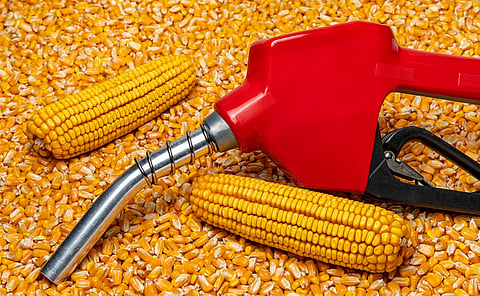Fuel at the cost of food security isn’t sustainable
India is accelerating its push for biofuels to cut fossil fuel imports and emissions, positioning bioenergy as a pillar of its clean energy strategy. The roadmap spans seven fuels—bioethanol, compressed biogas (CBG), biodiesel, bio-pellets, green hydrogen, sustainable aviation fuel (SAF), and bio-methanol—with a production target of 2.2 exajoules (EJ) by 2029-30. Bio-pellets and green hydrogen will dominate, with ethanol, biodiesel, and CBG also playing vital roles. While often derived from organic waste and considered sustainable, these fuels lose credibility when food crops are diverted, or land is repurposed—raising hard questions about food security, land use, and fairness.
The food-fuel-feed tradeoff is a concern. Meeting the 2025-26 ethanol target (10.16 billion litres) may require 275 million tonnes (MT) of sugarcane, 6.1 MT of maize, and 5.5 MT of rice—using up to seven million hectares of cropland. This diverts resources from food and poultry feed, threatening nutrition security and rural livelihoods.
Another aspect is subsidisation of fuel via food subsidy. In Ethanol Supply Year (ESY) 2024-25, 5.2 MT of rice from the Food Corporation of India was sold for ethanol production at Rs 22.5/kilogram (kg). This was well below the economic cost of producing a kg of rice at Rs 42. The price gap was absorbed through the national food subsidy. This raises concerns about the use of grains from public stocks for fuel, especially when surpluses are driven by minimum support price-linked bonuses.
There is also the impact on meal markets. Ethanol by-product Dried Distillers Grains with Solubles or DDGS is displacing soybean meal in animal feed, depressing soybean prices and discouraging domestic crushing. Despite surplus soybean, edible oil imports continue, undermining farmer incomes and India’s self-reliance goals.
And what of energy efficiency? Producing a kg of green hydrogen requires 60-70 kWh of power but yields only 33-37 kWh, raising concerns about efficiency and energy returns.
Biofuels can support India’s green transition—especially when waste-based. But using food crops or subsidies for fuel creates difficult trade-offs. Just as an EV powered by coal isn’t truly green, fuel at the cost of food security isn’t sustainable. A lifecycle- and equity-based approach is essential to ensure India’s biofuel future is truly fair and green.
Shweta Saini is an agricultural economist and co-founder, Arcus Policy Research
Views expressed are the author’s own and don’t necessarily reflect those of Down To Earth

